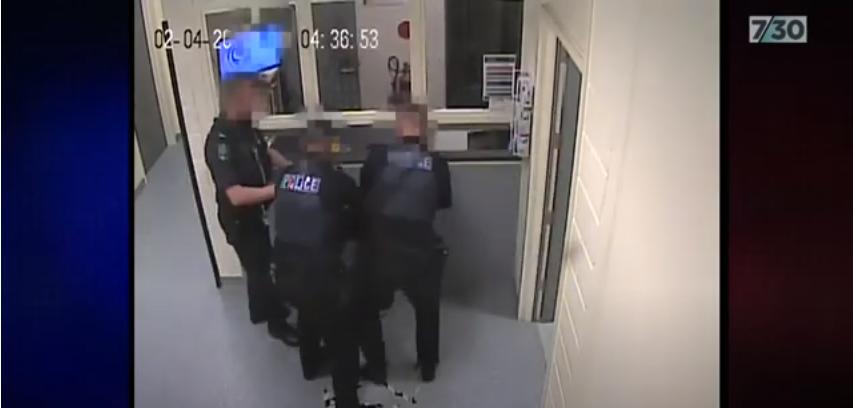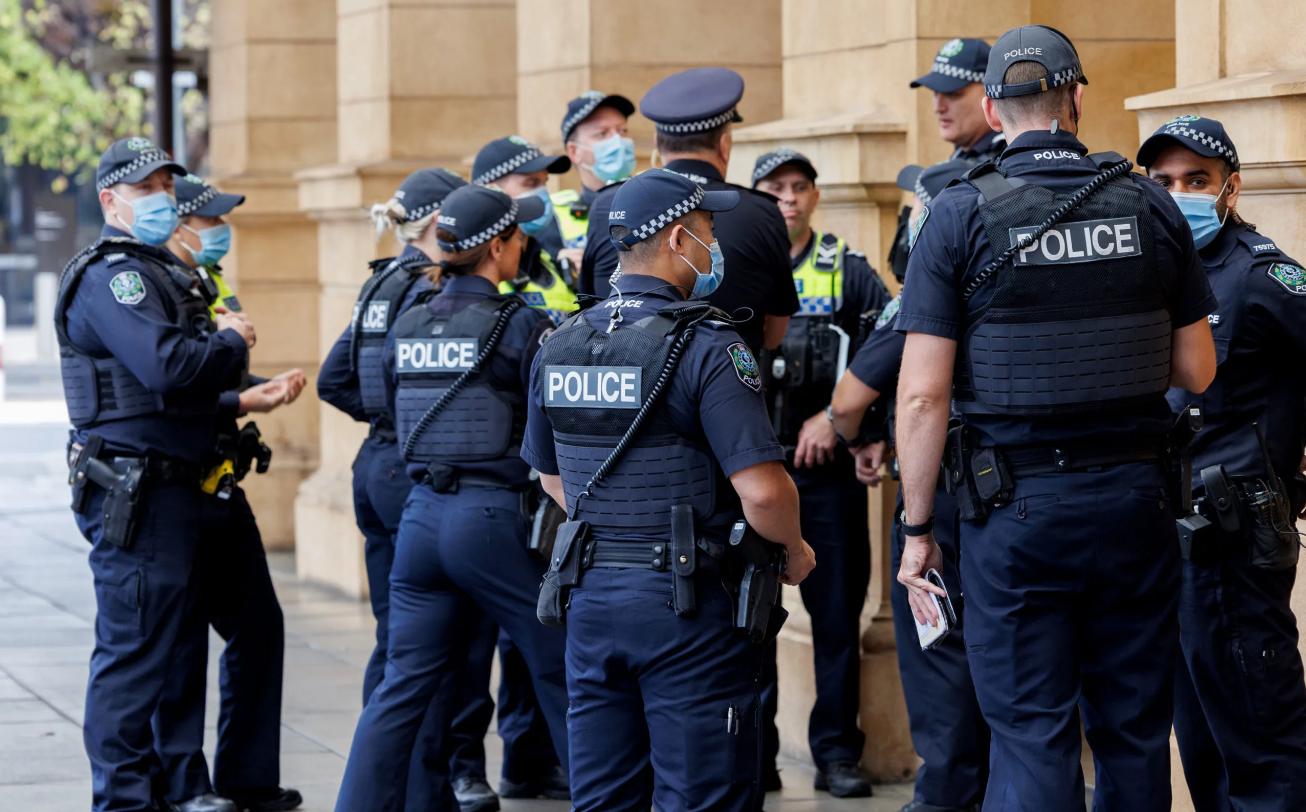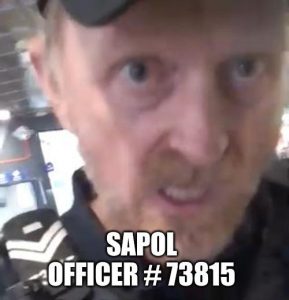ABC 7.30 Speaks to Victims of South Australia Police Brutality

ABC’s 7.30 investigates SAPOL brutality, and speaks to two victims of thuggish police officers.
Nathan Cross, while handcuffed and restrained by 3 police officers, had his head deliberately rammed into a counter ledge by serial thug Senior Constable Benjamin Higgins. The impact knocked him out cold and has left him with lasting brain injury.
Higgins was also captured on video coward-punching a handcuffed young man arrested for graffiti. Rather than face charges, Higgins was congratulated by bad-tempered SAPOL Commissioner Grant Stevens in a since-removed post, warning South Australians that if they messed with police they were going to get hurt.
Tough words from a cowardly desk jockey. When Stevens was ordered to appear in court in 2022 by lawyers for Deni Vernhagen, who along with others was challenging the Covid vaccine mandates, he first tried to weasel his way out by claiming he suffered an illness, which he later claimed was an unspecified “virus”.
When that excuse failed, he finally showed up to court, but not without over a dozen officers to guard him. The frightened Stevens feared a small group of protesters might wave signs at him and yell “shame!” like they did with Nicola “Do Not Touch that Ball!” Spurrier a week earlier.

A senior police officer unhappy with the way the already corrupt SAPOL has become even worse during Stevens’ overpaid reign, said he did not recall in Stevens’ “nearly six years in the job, the current Commissioner gracing the inside of a patrol vehicle or walking the beat for a shift, to witness what is happening out on the frontline” like previous commissioners did.
Stevens’ vindictive response was predictable: He suspended the officer who wrote the letter.
“They’re meant to serve and protect, not harass and destroy,” said Nathan, who is still suffering from trauma as a result of Higgins’ disgusting and cowardly behaviour.
Another incident of police brutality and malicious prosecution involved Alexander Wilding, who is on the autism spectrum. A police officer began harassing a young, skinny Alexander at Adelaide railway station and the exchange became heated when Alexander was unable to show a concession card for his ticket.
“He just started yelling at me like he was a drill instructor, and I was a recruit for the military”, said Alexander.
Alexander tried to walk away, but was immediately chased down by the demented officer, thrown to the ground and arrested.
The guilty officer did what all cops do in this situation and lied through his teeth, claiming Alexander punched him. CCTV footage of the incident shows this to be a lie, with no punch thrown by Alexander. Yet Alexander was charged with assault.
All this, over a concession card accidentally left at home.
“My experience is that whenever a police officer has assaulted someone, or accused of assaulting someone, is they’ll almost immediately lay charges for assaulting police against them,” says Andrew Carpenter, an Adelaide lawyer who has successfully sued SAPOL on behalf of its victims.
Assistant Police Commissioner Phillip Newitt told ABC that police do not use assault charges as a weapon against the people they bash and assault, which is a proven lie. He said there is no “official sanction” for such behaviour, that it is not tolerated, and that it is investigated.
When Newitt says these incidents are “investigated”, he means a whitewash is carried out and SAPOL inevitably finds the guilty officers did nothing wrong. In cases where they settle with victims, they admit no wrongdoing and impose a gag order on the settlement.
Andrew Carpenter said he has had clients who suffered brain injuries and facial reconstructions as a result of assaults committed by the cowardly thugs at SAPOL.
Section 45 of the transparency-crushing Police Complaints and Discipline Act 2016 ensures that police officers who commit assault enjoy the privelige of secrecy. An example is a case last year in which 2 officers were charged with kicking and stomping on the head of a handcuffed detainee. One of the accused parties was an ex-military personnel who fought in the Middle East opium and oil war, fancies himself as quite the socialite, and was widely promoted in the media as a ‘hero’ and poster boy SAPOL recruit upon his return. An online search indicates he is still with SAPOL, and no reason has ever been given as to why his and the other officer’s names have been suppressed.
“Any time someone makes a complaint against an officer, everything gets buried,” says Carpenter. “It’s illegal to be reported on, it’s illegal to be discussed, so anything that happens that way, people never get the justice they deserve.”
ABC revealed the state of South Australia has settled a mere 20 police assault claims over the last 10 years,for a total of $4.2 million. The cost is borne, not by the guilty cowards responsible for these attacks, but by South Australian taxpayers.
The full ABC’s 7.30 segment can be viewed in the video below.
Source
Allegations of excessive use of force by South Australia Police | 7.30. ABC News In-depth.



If you want some interesting insights into the Police Complaints and Discipline Act, how it works and the views of SAPOL, PASA et al about complaints, just look at the submissions and evidence transcripts to the SA Parliament’s Crime and Public Integrity Policy Committee inquiry into the operation of the PCDA.
I’ve also seen reports from overseas that it’s important for officers to repeatedly yell ‘stop resisting’ while assaulting, sorry – arresting, a person, so that the body-cam audio (during a scuffle the vision is impaired) will support the resisting charge and contradict complaints; it may also influence the recollections of any witnesses. Or maybe I’m just too cynical.